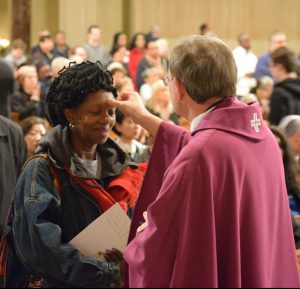
Several years ago, I read an article where the author stated, “Lent is an excuse to be better.” I am reminded of these words every time Ash Wednesday comes around, because they summarize what most people perceive the Season of Lent to be: a 40-day journey to improve, a time to become a better person, an opportunity to reignite our baptismal commitment, a moment to enhance our discipleship, a pilgrimage of six weeks to more perfectly reflect the image and likeness of Christ. Lent is a time to fulfill the mandate given by Jesus in the Gospel for the First Sunday of Lent: “Reform your lives and believe in the Gospel!” (Mark 1:15)
As a Christian, what does it mean to reform?
To reform means to recognize that we are imperfect, to admit that we do make mistakes and that we have some “not-so-good” areas in our life and that now, we are going to turn our back on these mistakes and these areas of life and make a change. To reform means to face up to those sinful facets of our life, and turn away from them; to admit that we are not without flaws and decide to do something about them.
If we are honest with ourselves, we can all be selfish. Sometimes we look to our own comfort before taking care of the needs of others. There are times when jealousy rears its ugly head. Although our vision might be 20/20, each of us is a little blind when it comes to our imperfections, admitting our failings and neglecting the needs of others.
The bottom line is, we all have faults, we all have weaknesses, and we are all imperfect people. This is part of the human condition. To reform means to confront our faults, weaknesses and imperfections and do something to change them.
Lent encourages us to begin anew.
Throughout the centuries, Christians have found the Season of Lent to be a time to reform one’s life – a time of special grace. We could not do any better than to follow in the footsteps of our ancestors and use these days of Lent as an opportunity to rediscover the power and peace that comes from making our lives whole. This wholeness is the result of reform and change. Reform and change are the result of an honest evaluation of our lives.

The words we hear as the ashes are imposed on our foreheads, “Repent and believe in the Gospel” are the essential command of Jesus as he proclaimed the Kingdom of God. The Catechism of the Catholic Church indicates that “Christ’s call to conversion continues to resound in the lives of Christians” (1428) and that “conversion is the work of the grace of God, who makes our hearts turn to him” (1432). It is God who gives us the strength to begin anew. This new beginning “is a radical reorientation of our whole life, a return, a conversion to God with all our heart, an end of sin, a turning away from evil” a “resolution to change one’s life with hope in God’s mercy and trust in the help of God’s grace” (1431).
The Catechism teaches that “conversion is accomplished in daily life by gestures of reconciliation, concern for the poor, the exercise and defense of justice and right, by the admission of our faults to our neighbor, fraternal correction, revision of life, examination of conscience, spiritual direction, acceptance of suffering, and endurance of persecution for the sake of righteousness” (1435).
During these days of Lent each of us is invited to respond to the call of the Lord to “reform our lives.” Lent is our excuse to do better. Do not find an excuse not to become better!

